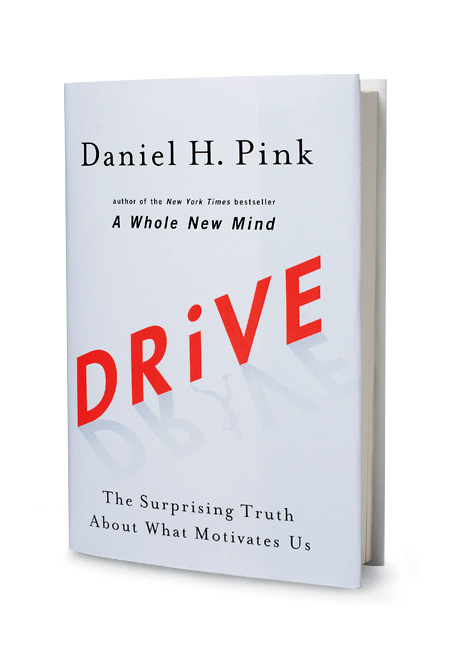What motivates you? The praise of others? The feeling of accomplishment? It is a leader’s job to know both what motivates them and what motivates those on their team. Daniel Pink has done a masterful job breaking this down in his newest book Drive. Motivation matters. I am part of the Millenial generation that cares more about having a distinct purpose rather than creating a product. I want to do something with my life that far outlives my days on this earth.
I highlighted several things while reading and have posted them below…
- Human beings have an “inherent tendency to seek out novelty and challenges, to extend and exercise their capacities, to explore, and to learn.” Edward Deci
- Routine work can be outsourced or automated; artistic, empathetic, non routine work generally cannot.
- Motivation 2.0 “Rewarding an activity will get you more of it. Punishing an activity will get you less of it.”
- People use rewards expecting to gain the benefit of increasing another person’s motivation and behavior, but in so doing, they often incur the unintentional and hidden cost of undermining that person’s intrinsic motivation toward the activity.
- The Sawyer Effect “Not always, but a lot of the time, when you are doing a piece for someone else it becomes more “work” than joy. When I work for myself there is the pure joy of creating and I can work through the night and not even know it. On a commissioned piece you have to check yourself–be sure to do what the client wants.”
- Rather than being offered as an ‘over-the-counter’ salve for boosting performance, goal setting should be prescribed selectively, presented with a warning label, and closely monitored. Goals that people set for themselves and that are devoted to attaining mastery are usually healthy. But goals imposed by others–sales targets, quarterly returns, standardized test scores, and so on–can sometimes have dangerous side effects.
- The short-term prize crowds out the long-term learning.
- Any extrinsic reward should be unexpected and offered only after the task is complete.
- Type 1 behavior is self-directed. It is devoted to becoming better and better at something that matters. And it connects that quest for excellence to a larger purpose.
- “The ultimate freedom for creative groups is the freedom to experiment with new ideas. Some skeptics insist that innovation is expensive. In the long run, innovation is cheap. Mediocrity is expensive–and autonomy can be the antidote.” Tom Kelley, General Manager IDEO
- The billable hour has little place in Motivation 3.0.
- Without sovereignty over our time, it’s nearly impossible to have autonomy over our lives.
- Encouraging autonomy doesn’t mean discouraging accountability.
- Control leads to compliance; autonomy leads to engagement.
- “The desire to do something because you find it deeply satisfying and personally challenging inspires the highest levels of creativity, whether it’s in the arts, sciences, or business.” Teresa Amabile, Professor at Harvard University
- Mastery is a mindset.
- Mastery is a pain.
- “Being a professional is doing the things you love to do, on the days you don’t feel like doing them.” Julius Erving, basketball legend
- When the cold front of demographics meets the warm front of unrealized dreams, the result will be a thunderstorm of purpose the likes of which the world has never seen.
- “I believe wholeheartedly that a new form of capitalism is emerging. More stakeholders want their businesses to…have a purpose bigger than their product.” Mats Lederhausen, investor and former McDonald’s executive
- In business, we tend to obsess over the “how”–as in “Here’s how to do it.” Yet we rarely discuss the “Why”–as in “Here’s why we’re doing it.” But it’s often difficult to do something exceptionally well if we don’t know the reasons we’re doing it in the first place. People at work are thirsting for context, yearning to know that what they do contributes to a larger whole. And a powerful way to provide that context is to spend a little less time telling how and a little more time showing why.
- How might you increase the number of optimal experiences and reduce the moments when you felt disengaged or distracted?
- Let’s not waste our kids’ time on meaningless exercises. With a little thought and effort, we can turn homework into homelearning.
- Carrots and sticks are so last century. Drive says for 21st century work, we need to upgrade to autonomy, mastery, and purpose.
- Motivation 1.0 presumed that humans were biological creatures, struggling for survival. Motivation 2.0 presumed that humans also responded to rewards and punishments in their environment. Motivation 3.0, the upgrade we now need, presumes that humans also have a third drive–to learn, to create, and to better the world.
